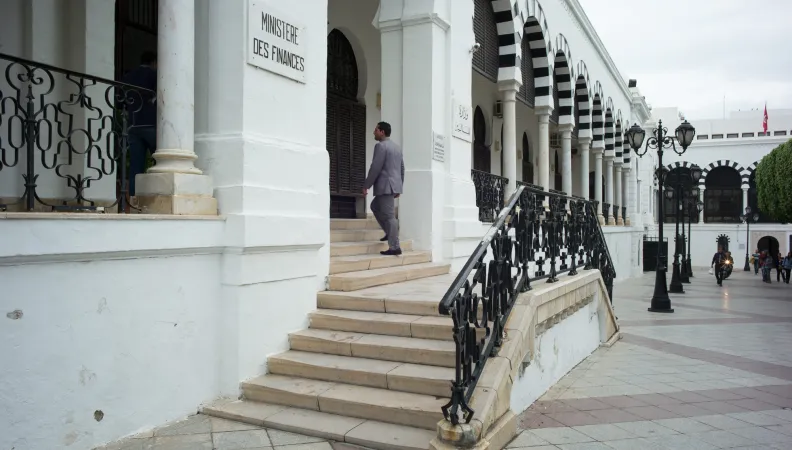Share the page
Institutional strengthening – Our work and impact

International development cooperation is fundamentally rooted in the willingness of countries to share best practices, transfer know-how, and work together towards the development of fairer, more peaceful, inclusive, resilient societies. In short, it is grounded in human cooperation.
1,398 institutions underwent capacity strengthening in democratic, economic and financial governance in 2024.
As France’s development cooperation agency, we deploy French, European and international experts to support our partners in institutional strengthening and the enhancement of their institutional and organisational capacities. This takes shape through a wide range of activities across all our focus areas, from building capacity and bringing stakeholders together to making specific technical expertise available.
Our strategic priorities
Institutional strengthening is a cross-cutting focus area within our agency, and a key objective for the vast majority of our technical cooperation projects, which aim to strengthen the institutions and public policies of our partner countries and organisations.
We work with our partners to strengthen their institutional and organisational capacities across a broad spectrum of areas. This includes the areas of climate, stability and resilience, corruption, health systems efficiency, and facilitation of trade and exchange, as well as the area of governance – namely public finance management, justice, state reform and modernisation, migration, human trafficking and human rights.
“Consolidating civil society institutions and making territories more attractive requires long-term efforts, including change management and training of local actors.”
- CEO of Expertise France

Our framework for action
Our work aligns with French, European and international priorities on institutional strengthening and good governance, as well as with the strategic objectives of the Agence Française de Développement (AFD) Group.
Through the Presidential Council for International Partnerships (CPPI in French), France has reaffirmed its commitment to strengthening the capacity of partner states to generate and manage their resources sustainably, in line with the United Nations Sustainable Development Goals (SDGs).
We also support a wide range of European and international agreements and initiatives related to our areas of expertise, such as the Global Compact for Safe, Orderly and Regular Migration and the European Commission’s Global Gateway initiative, which seeks to build sustainable and trusted connections that work for people and the planet.
For further reading
Our services in this area
We rely on a broad network of public experts and private partners, making French, European and international expertise available through our projects. In the cross-cutting field of institutional strengthening, we offer a wide range of tailored services that are co-designed with our partners:
- Technical assistance
- Capacity strengthening
- Development of solutions and implementation of innovative approaches
- Analysis and audits
- Stakeholder collaboration
- Transfer of knowledge and skills
- Peer-to-peer learning
- Facilitation of multi-stakeholder, multi-level, multisector dialogue
Resources for download
FAQ - More about institutional strengthening
Find out further information on institutional strengthening.
The UN defines capacity strengthening, also known as capacity building, as “the process of developing and strengthening the skills, instincts, abilities, processes and resources that organisations and communities need to survive, adapt, and thrive in a fast-changing world.”
According to the United Nations Development Programme (UNDP) and the Organisation for Economic Co-operation and Development (OECD), capacity strengthening enhances knowledge and skills on an individual (training, skills), organisational (processes, coordination) and systemic (legal frameworks, political landscape) level. Capacity strengthening is a central pillar of international cooperation in reducing dependence on external aid and increasing resilience.
A capacity strengthening, or capacity building, project provides structured and/or technical support to improve the core functions of a public institution, public body or company. This may include:
- Technical training for staff (civil service, local authorities, civil society)
- Organisational support (institutional analysis, restructuring, governance)
- Support for the development of public policies and strategies in each area of action
- Development of regulatory frameworks
- Support for digital transformation and the green transition, and awareness on key development issues such as gender equality and inclusion
Expertise France implements such projects across diverse sectors such as health, justice, climate and digital technologies.
Institutional and organisational capacity strengthening often follows a four-step process:
- Capacity assessment to diagnose areas for improvement
- Capacity development planning through multi-stakeholder workshops to co-design a strategy
- Implementation of capacity development plans through continuous training, mentoring and peer learning
- Monitoring and evaluation using dashboards, performance and governance indicators
These approaches promote local ownership and long-term autonomy.
Key figures in 2024
- 1,398 institutions underwent capacity strengthening in democratic, economic and financial governance, including 68 institutions in the justice sector
- 19K staff received training in democratic, economic and financial governance, including 1,487 in the justice sector
- 178 binding documents about democratic, economic and financial governance were drafted or edited with the support of Expertise France
